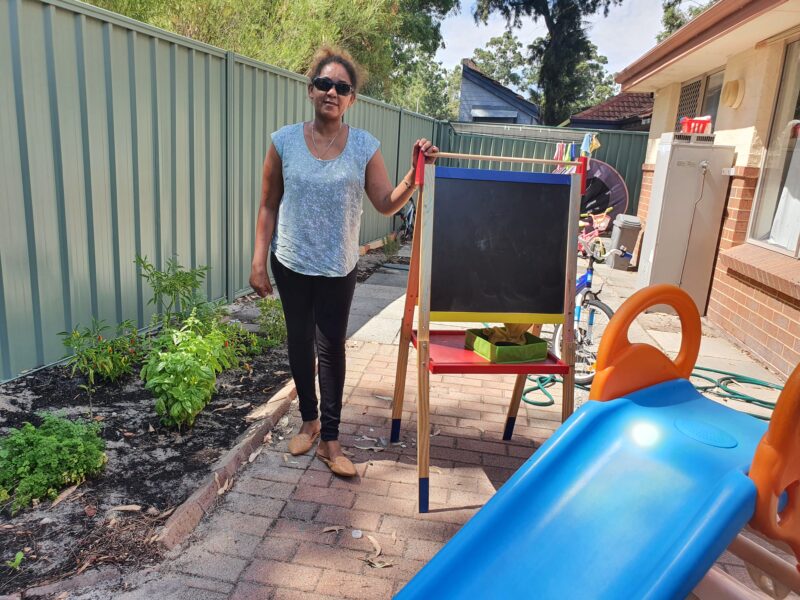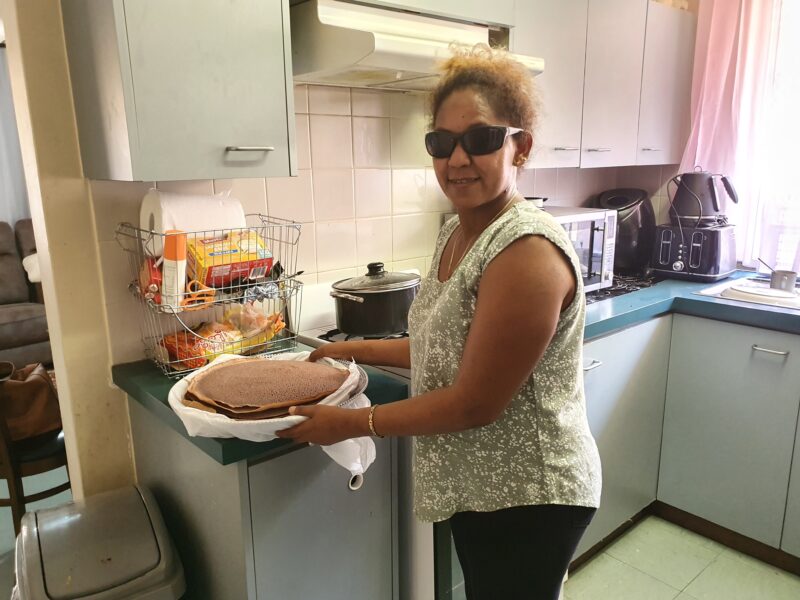When English isn’t your first language, you live with blindness because of diabetes and your marriage has recently broken down, life can be challenging.
It’s no wonder then that Saba describes VisAbility Social Worker Marija as a ‘wonderful human being’.
Originally from Eritrea, Saba has had diabetes from a young age.
She spoke to us recently through the Government’s interpreter service to explain how Social Worker Marija has supported her in recent months.

Saba’s story
Marija was there for me when I hit rock bottom. Originally from Eritrea, I moved to Sudan, Kenya then South Africa.
While living in South Africa I was attacked in one of my eyes by an armed gang.
I met my husband through relatives. He is originally from Eritrea but has Australian citizenship.
Up until fairly recently, I was living in Newman with my husband. I knew my eyesight was deteriorating because of my diabetes which I’ve had since the age of five. It has always impacted my vision to varying degrees.
I would occasionally lose consciousness and have blackouts because my blood sugar levels were low. I was expecting twins in my first pregnancy but had complications, so only one survived. My son is now seven.
Three years later, when I was expecting my daughter, I had more pregnancy complications because of my diabetes. I was airlifted to King Edward Hospital in Perth from Newman and fell into a coma. My daughter arrived healthily and is now three-years-old.

When my marriage broke down, I knew I should move to Perth because of my health and deteriorating sight. I arrived in the city and felt isolated. I couldn’t speak the language, had no house, was legally blind, had no job, and had no financial support. Plus, my blood family was still in Africa. I ended up in a women’s refuge.
Social work support for low vision
I was referred to VisAbility following an appointment at Royal Perth Hospital. A member of VisAbility’s Client Experience Team Josef got in contact. I didn’t realise it at the time, but he was a psychologist. He immediately put me at ease, understood I was distressed, and faced many challenges.
He forwarded my details to Marija, the VisAbility social worker and she rang me, it was as though a huge weight had been lifted off my shoulders. Marija was able to find out about my situation, my immediate requirements, and the assistance I required through the use of an interpreter through the Australian Government’s Translating and Interpreting Service (link opens in new window).
Marija told me about the NDIS and other types of funding available for people living with vision impairment. Together we worked on my applications.
My greatest fear was that I would lose my two children. I don’t want them to go into foster care. They are my world.
Lodging an NDIS application due to blindness through diabetes
She helped me to gather my medical evidence for my NDIS application. It progressed quickly. I am now planning the support and services I need. Marija’s been there to talk to me whenever I’ve needed assistance. She rings me regularly to check in and see how I am doing.

I’m a pretty positive person. My seven-year-old son is my sighted guide and helps me get around the house. He can make short calls on my behalf or write basic emails because he speaks English.
My ex-husband now lives in Perth and supports me a lot. He will come and look after the children and because he drives he can take them out. We make East African savoury pancakes and bread and drink Eritrean tea.
Marija found me a fridge, so I can store my insulin high away from the children. It’s these little things that count.
I’ve also received ongoing support from Ishar Multicultural Women’s Health Services and Centrecare. Marija has liaised with the two when I’ve needed it. It’s great teamwork.
As a Christian, I have a strong faith and pray every day and I think God has a plan for me. Moving forward, I’ll learn to use the white cane, have some orientation and mobility sessions and become independent.
I’m grateful I’m living in Australia – if I was still in Eritrea or Sudan, my circumstances would be very different.
Our Social Worker Marija is officially the top Social Worker in Australia after securing the top prize in the Allied Health Awards. Find out more about our Social Work Services and get the support you need today.
